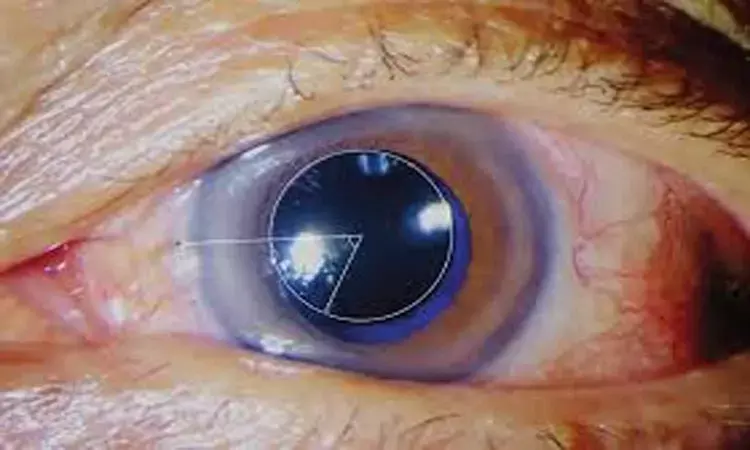- Home
- Medical news & Guidelines
- Anesthesiology
- Cardiology and CTVS
- Critical Care
- Dentistry
- Dermatology
- Diabetes and Endocrinology
- ENT
- Gastroenterology
- Medicine
- Nephrology
- Neurology
- Obstretics-Gynaecology
- Oncology
- Ophthalmology
- Orthopaedics
- Pediatrics-Neonatology
- Psychiatry
- Pulmonology
- Radiology
- Surgery
- Urology
- Laboratory Medicine
- Diet
- Nursing
- Paramedical
- Physiotherapy
- Health news
- Fact Check
- Bone Health Fact Check
- Brain Health Fact Check
- Cancer Related Fact Check
- Child Care Fact Check
- Dental and oral health fact check
- Diabetes and metabolic health fact check
- Diet and Nutrition Fact Check
- Eye and ENT Care Fact Check
- Fitness fact check
- Gut health fact check
- Heart health fact check
- Kidney health fact check
- Medical education fact check
- Men's health fact check
- Respiratory fact check
- Skin and hair care fact check
- Vaccine and Immunization fact check
- Women's health fact check
- AYUSH
- State News
- Andaman and Nicobar Islands
- Andhra Pradesh
- Arunachal Pradesh
- Assam
- Bihar
- Chandigarh
- Chattisgarh
- Dadra and Nagar Haveli
- Daman and Diu
- Delhi
- Goa
- Gujarat
- Haryana
- Himachal Pradesh
- Jammu & Kashmir
- Jharkhand
- Karnataka
- Kerala
- Ladakh
- Lakshadweep
- Madhya Pradesh
- Maharashtra
- Manipur
- Meghalaya
- Mizoram
- Nagaland
- Odisha
- Puducherry
- Punjab
- Rajasthan
- Sikkim
- Tamil Nadu
- Telangana
- Tripura
- Uttar Pradesh
- Uttrakhand
- West Bengal
- Medical Education
- Industry
Triamcinolone–moxifloxacin combo prevents macular edema in diabetic retinopathy after cataract surgery

Researchers have found in a new study that Triamcinolone acetonide–moxifloxacin maintained the stability of postoperative central macular thickness (CMT) in patients undergoing cataract surgery with preexisting diabetic retinopathy in the short term. The research has been published recently in the Journal of Cataract & Refractive Surgery.
Clinically significant macular oedema (CSMO) present at the time of cataract surgery is likely to progress and eyes with previously treated CSMO are at increased risk of recurrence. The risk of progression is increased if the operation is complicated by excessive manipulation, vitreous loss, or severe post-operative inflammation.
Researchers evaluated the effect of intravitreal triamcinolone acetonide–moxifloxacin at the time of cataract surgery on central macular edema in patients with preexisting diabetic retinopathy.
The retrospective chart review included 75 eyes of 64 patients who had undergone recent cataract surgery. Intravitreal injection of triamcinolone–moxifloxacin was given at the time of surgery.
"We aimed to record the visual acuity and central macular thickness (CMT) with optical coherence tomography at preoperative and postoperative visits," says Julia Angkadjaja, MD, Loma Linda University Eye Institute, Loma Linda University Health, Loma Linda, California, USA.
Hence, the authors drew the following results-
a. Mean visual acuity at 4 to 6 weeks, 6 to 12 weeks, and 12 weeks or more postoperatively was 0.32, 0.35, and 0.43, respectively.
b. Mean CMT 4 to 6 weeks postoperatively for 46 eyes decreased from 299 μm to 297 μm.
c. Mean CMT 6 to 12 weeks postoperatively for 34 eyes increased from 317 μm to 344 μm.
d. Mean CMT 12 weeks or more for 60 eyes increased from 295 μm to 328 μm.
As a result, the conclusion was the "Intravitreal triamcinolone acetonide–moxifloxacin at the time of cataract surgery for patients with diabetic retinopathy maintained stable central macular thickness in the postoperative period, most notably in the 4- to 6-week period."
For the full article click on the link: 10.1097/j.jcrs.000000000000024
Dr. Nandita Mohan is a practicing pediatric dentist with more than 5 years of clinical work experience. Along with this, she is equally interested in keeping herself up to date about the latest developments in the field of medicine and dentistry which is the driving force for her to be in association with Medical Dialogues. She also has her name attached with many publications; both national and international. She has pursued her BDS from Rajiv Gandhi University of Health Sciences, Bangalore and later went to enter her dream specialty (MDS) in the Department of Pedodontics and Preventive Dentistry from Pt. B.D. Sharma University of Health Sciences. Through all the years of experience, her core interest in learning something new has never stopped. She can be contacted at editorial@medicaldialogues.in. Contact no. 011-43720751
Dr Kamal Kant Kohli-MBBS, DTCD- a chest specialist with more than 30 years of practice and a flair for writing clinical articles, Dr Kamal Kant Kohli joined Medical Dialogues as a Chief Editor of Medical News. Besides writing articles, as an editor, he proofreads and verifies all the medical content published on Medical Dialogues including those coming from journals, studies,medical conferences,guidelines etc. Email: drkohli@medicaldialogues.in. Contact no. 011-43720751


